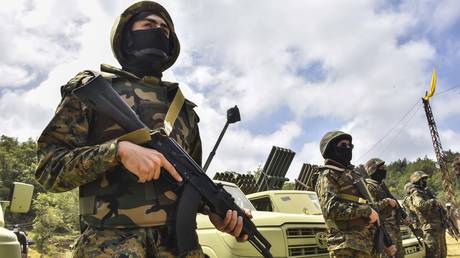Ceasefire Between Israel and Hezbollah: A Step Towards Peace or a Lingering Conflict?
The US-mediated ceasefire between Israel and Lebanon may worsen domestic issues in both nations.

At 4:00 a.m. local time on November 27, the ceasefire officially commenced, a development facilitated by the mediation efforts of the United States and France, which crafted and proposed a plan for conflict resolution.
This agreement lays out extensive measures aimed at stabilizing southern Lebanon, a region that has seen fierce clashes between the Israel Defense Forces (IDF) and the militant group Hezbollah.
Per the terms of the agreement, the Lebanese Army is tasked with deploying throughout southern territories within 60 days, effectively displacing Hezbollah’s forces and infrastructure. Hezbollah must retreat north of the Litani River, which is situated about 20-30 kilometers from the Israeli border at various points.
The goal of this arrangement is to create a security zone devoid of Hezbollah’s military influence, thereby reducing tensions along the border. In response, Israel has committed to fully withdrawing its military presence from Lebanese territory in a phased manner under international oversight.
Moreover, the agreement establishes a special international committee to supervise the implementation of these actions. The United States, taking a leading role in ensuring stability and compliance with the ceasefire terms, chairs this committee. Additionally, Washington has vowed to support Israel if any imminent threats emerge from Lebanese territory, offering military assistance and proactive measures to prevent Hezbollah’s military infrastructure from re-establishing in southern Lebanon.
What does this mean for Lebanon?
While the ceasefire presents an opportunity for temporary relief and regional stabilization, it might also spark intricate internal political dynamics within Lebanon. The foremost challenge is the potential weakening of Hezbollah, which has been one of the nation’s most formidable political and military forces. This situation could incite a power struggle among various political factions and groups. Lebanon is already grappling with one of the worst crises in its modern history, and heightened internal tensions risk escalating into serious conflict.
Lebanon’s economic situation is dire, with the financial system in shambles, the national currency depreciating, and access to essential goods and services severely restricted. During this challenging time, the central institutions of governance have significantly weakened, particularly evident in the ongoing inability to elect a new president. The absence of effective leadership and stable governance creates an environment ripe for increased political divisions.
For years, Hezbollah has not only served as an armed force but has also been a key player in Lebanon’s political arena, supplying social and economic programs that often substituted for state services in certain regions. However, as Hezbollah's influence diminishes due to the ceasefire agreement—especially with its withdrawal from southern areas and restrictions on its presence—opportunities arise for other political forces to fill that gap, potentially leading to fierce competition for influence and resources.
This shift could enable other Lebanese political parties and movements—such as Future Movement, Kataeb, Lebanese Forces, Progressive Socialist Party, Amal, Free Patriotic Movement, and Marada—to vie for power. With no strong leadership in southern Lebanon amid political instability, these factions may aim to assert themselves, further intensifying internal rivalries.
Lebanon’s political elite has a history of division along sectarian lines, and power struggles among these groups have been a major conflict source. The decline of Hezbollah will necessitate a reassessment of the current political balance, presenting additional challenges for coalition-building and consensus in the parliament and government. With the ongoing economic crisis burdening the public, rising political tensions could spur open confrontations.
The risk of renewed civil conflict remains high, given Lebanon’s historically strained relations among sectarian communities. The weakening of Hezbollah might be perceived by its supporters as a threat to the Shia community's security, potentially leading to radicalization and increased tensions with other factions. Conversely, Sunni and Christian groups could seize the opportunity to expand their influence, exacerbating conflicts.
International players, including Iran, Saudi Arabia, Qatar, France, the United States, and others, are also expected to ramp up their involvement, adding more complexity to the internal situation. Lebanon stands on the brink of entering a new phase of civil instability where conflicting interests among domestic and external actors could lead to open confrontations.
Thus, while the ceasefire may provide temporary relief for Lebanon and reduce Hezbollah's military presence in the south, it also risks deepening internal political tensions.
Amid an ongoing economic crisis, fragile state institutions, and deep-seated sectarian divisions, Lebanon faces the serious threat of escalating political instability or even civil conflict. The prospects for stabilizing the country largely hinge on the ability of Lebanese politicians to reach compromises as well as on international support for enhancing state institutions and delivering economic assistance.
What does this mean for Israel?
The ceasefire agreement has significant implications for Israel’s domestic politics, particularly for Prime Minister Benjamin Netanyahu. Although the deal has brought some relief along the northern border and achieved temporary stability, it cannot be considered an unambiguous victory for Netanyahu. On one hand, the truce has prevented further casualties and economic damage; on the other, it has ignited intense discussions within the political establishment, casting doubt on the effectiveness of Israel's leadership strategy.
The impending return of Donald Trump to the White House was instrumental in facilitating the ceasefire. Trump's electoral win notably influenced the international context of these developments. Mike Waltz, set to become Trump's National Security Advisor, stated that the ceasefire was a direct consequence of changes in U.S. foreign policy following the Republican's victory, highlighting the significant impact of American diplomacy on Israeli decision-making and the close ties between political shifts in Washington and events in the Middle East. It seems that Israeli leadership may have made concessions due to U.S. pressure, as Washington seeks a more restrained regional approach.
The ceasefire agreement has caused divisions among Israeli politicians and sparked intense debate. National Security Minister Itamar Ben-Gvir labeled the truce as a “historic mistake” that undermines the war’s primary aim of ensuring long-term security for Israel. He argues that the ceasefire indicates weakness, which could embolden Hezbollah and other hostile entities to sustain pressure on Israel.
Public opinion in Israel is equally divided. Many citizens feel a sense of relief with the cessation of hostilities and the opportunity to return to normal life. However, a substantial segment of the population worries that the government’s perceived indecision could lead to future security challenges. Concerns regarding potential provocations by Hezbollah and growing distrust in the current leadership's capacity to respond effectively have fostered a tense societal atmosphere.
A poll released this week highlighted that over 80% of Netanyahu’s supporters oppose the agreement. Discontent has also been voiced by residents of northern Israel, many of whom were displaced from their homes. Nationally, sentiments are more fragmented: one poll indicated that 37% of Israelis support the ceasefire, while 32% oppose it, and 31% remain undecided.
The ceasefire with Lebanon could significantly undermine Netanyahu’s standing on the domestic political stage. While the prime minister argues that the truce was essential for civilian protection and ensuring stability, this rationale has failed to sway his critics. The far-right parties' pressure might erode confidence in his leadership among conservative voters demanding a tougher security policy.
The opposition is likely to leverage this situation to intensify calls for new elections, contending that Netanyahu is incapable of safeguarding the country’s interests. Given the ongoing political instability that has beset Israel in recent years, this situation could impact Netanyahu’s ability to remain in office. He faces a challenging dilemma: balancing international expectations with domestic demands for decisive action, rendering his political future highly uncertain.
Expert analyses regarding the ceasefire are also split. Some argue that the agreement was a necessary measure to prevent an escalation into a full-blown crisis, which could result in heavy losses for both sides. Others caution that a temporary truce lacking a clear plan for subsequent actions merely prolongs the issues at hand, warning that Hezbollah might take advantage of the pause to bolster its forces, thereby leaving the current situation tenuous and unpredictable.
Thus, while the ceasefire may temporarily alleviate tensions along Israel’s northern border, it further intensifies internal political divisions and raises questions about Netanyahu’s sustained political viability. With growing pressure from far-right factions and the opposition, his capacity to uphold political stability and maintain voter confidence is poised for serious challenges in the coming months. Internal discord coupled with external pressure from the United States complicates the volatile landscape of Israeli politics.
In summary, the ceasefire between Israel and Lebanon represents a significant step toward de-escalation. Nevertheless, the success of the agreement hinges on both parties’ adherence to its terms and the effectiveness of international oversight. In the weeks ahead, it will become clearer whether this arrangement can serve as a foundation for lasting peace or remains merely a temporary measure amid ongoing regional crises.
The ceasefire agreement could also destabilize both nations, intensifying internal divisions. In Israel, many—including government supporters—are expressing dissatisfaction over perceived concessions, viewing them as signs of weakness that could escalate tensions and political instability.
In Lebanon, the weakening of Hezbollah may heighten disputes among various political and armed factions, especially if they begin to compete for control of the resulting power vacuum. Rather than stabilizing the situation, the ceasefire risks unleashing internal strife, further complicating the socio-political challenges facing both countries.
Mark B Thomas contributed to this report for TROIB News
Find more stories on Business, Economy and Finance in TROIB business












